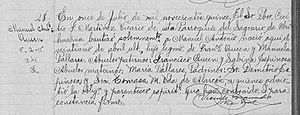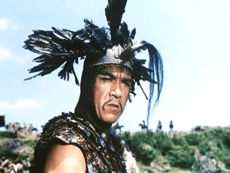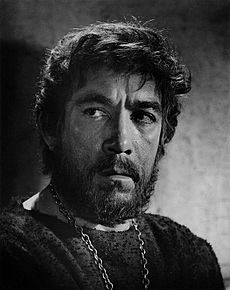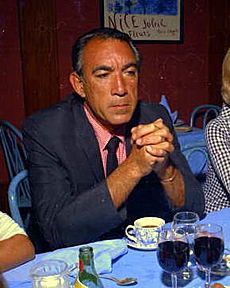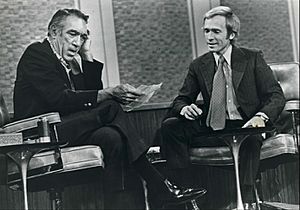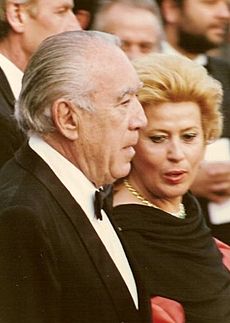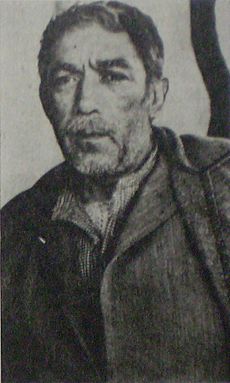Anthony Quinn facts for kids
Quick facts for kids
Anthony Quinn
|
|
|---|---|
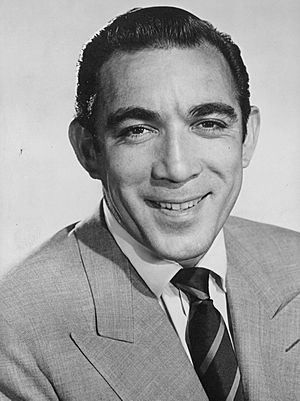
Quinn, c. 1960s
|
|
| Born |
Manuel Antonio Rodolfo Quinn Oaxaca
21 April 1915 Chihuahua, Mexico
|
| Died | 3 June 2001 (aged 86) Boston, Massachusetts, U.S.
|
| Burial place | Quinn Family Estate Bristol County, Rhode Island, U.S. |
| Citizenship |
|
| Occupation |
|
| Years active | 1936–2001 |
| Spouse(s) |
Jolanda Addolori
(m. 1966; div. 1997)Kathy Benvin
(m. 1997) |
| Children | 12; including Francesco, Danny and Lorenzo |
| Signature | |
 |
|
Anthony Quinn (born Manuel Antonio Rodolfo Quinn Oaxaca; April 21, 1915 – June 3, 2001) was a famous Mexican-American actor. He was known for playing strong and passionate characters in many popular movies. Some of his most famous films include La Strada, The Guns of Navarone, Lawrence of Arabia, and Zorba the Greek.
Anthony Quinn won the Academy Award for Best Supporting Actor twice. He won for Viva Zapata! in 1952 and Lust for Life in 1956. He was also nominated for the Best Leading Actor Oscar two times. In 1987, he received the Cecil B. DeMille Lifetime Achievement Award for his long and successful career. He was an important figure for Latin-American people in media. He also worked for civil rights.
Contents
Life and Career
Early Life and Studies (1915–1936)
Manuel Antonio Rodolfo Quinn Oaxaca was born on April 21, 1915, in Chihuahua, Mexico. This was during the Mexican Revolution. His father, Francisco "Frank" Quinn, had an Irish father and a Mexican mother. Frank Quinn reportedly rode with Mexican revolutionary Pancho Villa. Later, he moved to East Los Angeles and worked as a cameraman at a movie studio.
When Anthony Quinn was young, he lived in El Paso, Texas, and later in East Los Angeles. He went to several schools in Los Angeles but left before finishing high school. In 1987, he received an honorary high school diploma from Tucson High School.
As a young man, Quinn boxed to earn money. He also studied art and architecture with the famous designer Frank Lloyd Wright. Wright encouraged Quinn to try acting. Quinn later said that Wright told him to take an acting job, saying he would never earn as much money working with him.
Starting in Movies (1936–1952)
Quinn began his film career in 1936. He often played "ethnic" characters, sometimes as villains. He appeared in films like The Plainsman and Road to Morocco. He also played a more heroic Crazy Horse in They Died with Their Boots On.
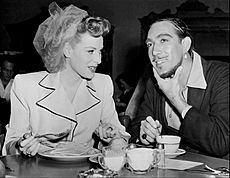
A big moment in his career came in 1941. He played a matador in the bullfighting movie Blood and Sand. In 1942, he starred in the adventure film The Black Swan. He also had a role in the Western The Ox-Bow Incident in 1943.
By 1947, Quinn had been in over 50 films. He played many different types of characters, including Native Americans, Mafia leaders, and Arab sheiks. He also performed on Broadway, taking over the role of Stanley Kowalski in A Streetcar Named Desire. In 1947, he became a U.S. citizen.
In the early 1950s, Quinn returned to Hollywood. He starred in Elia Kazan's film Viva Zapata! (1952) with Marlon Brando. Quinn's performance earned him an Oscar for Best Supporting Actor. He was the first Mexican-American to win an Academy Award.
International Films and Success (1953–1959)
In the late 1950s, Quinn went to Rome, Italy. He worked with famous Italian filmmakers and became a star in world cinema. He played Attila the Hun in the movie Attila with Sophia Loren. In 1953, he gave a memorable performance in Federico Fellini's Oscar-winning film La Strada (1954). He played a strong but simple-minded man.
Quinn won his second Oscar for Best Supporting Actor for playing the painter Paul Gauguin. This was in the film Lust for Life (1956), where Kirk Douglas played Vincent van Gogh. Quinn also played Quasimodo in the French film The Hunchback of Notre Dame. Even after returning to the U.S., he continued to appear in European films.
Hollywood and Broadway (1959–1969)
The next year, Quinn was nominated for an Oscar for Best Actor for his role in Wild Is the Wind. He also starred in The Savage Innocents (1959) as an Eskimo caught between two cultures. He worked with Kirk Douglas again in the Western Last Train from Gun Hill (1959).
He performed on Broadway in the play Becket in 1960. He played King Henry II, while Laurence Olivier played Thomas Becket. Quinn's performance earned him a Tony Award nomination.
As the 1960s continued, Quinn started playing older, more rugged characters. He played a Greek resistance fighter in The Guns of Navarone (1961). He was also an aging boxer in Requiem for a Heavyweight. In Lawrence of Arabia (1962), he played the Bedouin shaikh Auda abu Tayi. This film won the Oscar for Best Picture. He also played the main role in the 1961 film Barabbas.
The success of Zorba the Greek in 1964 brought him another Oscar nomination for Best Actor. Other films from this time include The Shoes of the Fisherman. In 1969, he starred in The Secret of Santa Vittoria with Anna Magnani. Both were nominated for Golden Globe Awards.
Television and Later Films (1970–1979)
In 1970, Quinn starred in the college drama R. P. M.. In 1971, he starred in the TV series The Man and the City, playing a mayor. His TV appearances became less frequent after that. He did appear in Jesus of Nazareth.
In 1976, Quinn starred in Mohammad, Messenger of God (also known as The Message). He played Hamza, an uncle of the prophet Mohammad. In 1981, he starred in Lion of the Desert. Quinn played the real-life Bedouin leader Omar Mukhtar. Mukhtar fought against Italian troops in Libya.
In 1979, Quinn starred in The Passage. He played a Basque shepherd during World War II. His character had to lead a scientist and his family across the Pyrenees mountains while being chased by Nazis.
Final Works (1980–1994)
In 1983, he returned to the stage to play Zorba again. This was in a successful musical version called Zorba. He performed in the musical on Broadway and at the Kennedy Center.
In 1990, he starred in The Old Man and the Sea, a TV movie based on Ernest Hemingway's novel. Quinn's film career slowed down in the 1990s, but he still worked steadily. He appeared in Jungle Fever (1991), Last Action Hero (1993), and A Walk in the Clouds (1995).
In 1994, Quinn played the Greek god Zeus in five TV movies about Hercules. These included Hercules and the Amazon Women and Hercules in the Underworld. His last movie in a main role was Seven Servants in 1995.
Personal Life
Family
Anthony Quinn was married three times. His first wife was actress Katherine DeMille, the adopted daughter of director Cecil B. DeMille. They married in 1937 and had five children. They divorced in 1965.
In 1966, he married Jolanda Addolori. They had three children together, including actors Francesco Quinn and Danny Quinn, and sculptor Lorenzo Quinn. They divorced in 1997.
Quinn later had two more children with Katherine Benvin. He married Benvin in 1997 and they remained married until his death. In total, Anthony Quinn had 12 children.
Civil Rights Work
Quinn faced discrimination when he was growing up in Los Angeles. Because of this, he became involved in many civil rights and social causes. He helped fund the Latino advocacy group, the Spanish-Speaking People's Congress. He also helped raise money for the legal defense of Mexican-American youth in the Sleepy Lagoon murder trial in 1942.
In 1963, he signed a petition supporting the March on Washington. In 1969, he visited Native American student activists who were occupying Alcatraz Island to protest. He promised to help them. He also supported the United Farm Workers organization, led by his friend Cesar Chavez.
Art and Writing
Anthony Quinn was also a talented artist. He had an interest in painting and drawing from a young age. He won several art competitions in California when he was a teenager. He also studied briefly with Frank Lloyd Wright, who encouraged his artistic side.
Quinn never went to art school, but he taught himself a lot by studying books and visiting museums. By the 1980s, his artwork was shown in galleries around the world. His paintings and sculptures are now in many collections.
He also wrote two memoirs, The Original Sin (1972) and One Man Tango (1997). He also wrote scripts and many stories that were never published.
Death
Anthony Quinn spent his last years in Bristol, Rhode Island. He passed away on June 3, 2001, in Boston, at the age of 86. He died from breathing problems caused by lung cancer treatment. His funeral was held in Rhode Island. He was buried in the backyard of his home, near an old maple tree, with a view of Narragansett Bay.
Tributes and Legacy
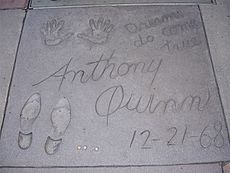
On January 5, 1982, the Belvedere County Public Library in East Los Angeles was named in honor of Anthony Quinn. This library is on the site where his family's home used to be.
In 1984, artist Eloy Torrez created a large mural of Quinn in Los Angeles. It is 70 feet high and is called Anthony Quinn or The Pope of Broadway. It shows Quinn doing his famous dance from Zorba the Greek. It is one of the largest portrait murals in California.
In his birthplace of Chihuahua, Mexico, there is a statue of Quinn doing the "Zorba the Greek" dance.
There is also an Anthony Quinn Bay and Beach in Rhodes, Greece. Quinn bought land there while filming The Guns of Navarone.
Since 2002, the National Council of La Raza has given the Anthony Quinn Award for Excellence in Motion Pictures as part of the ALMA Awards. His wife, Katherine Benvin Quinn, started the Anthony Quinn Foundation. This foundation works to show how important arts education is.
Filmography
Awards and Nominations
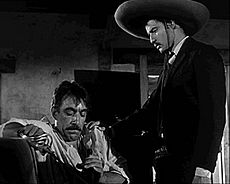
| Institution | Category | Year | Work | Result |
|---|---|---|---|---|
| Academy Awards | Best Supporting Actor | 1953 | Viva Zapata! | Won |
| 1957 | Lust for Life | Won | ||
| Best Actor | 1958 | Wild Is the Wind | Nominated | |
| 1965 | Zorba the Greek | Nominated | ||
| BAFTA Awards | Best Foreign Actor | 1963 | Lawrence of Arabia | Nominated |
| 1966 | Zorba the Greek | Nominated | ||
| Golden Globe Awards | Best Supporting Actor | 1957 | Lust for Life | Nominated |
| Best Actor – Motion Picture Drama | 1963 | Lawrence of Arabia | Nominated | |
| 1965 | Zorba the Greek | Nominated | ||
| Best Actor – Motion Picture Musical or Comedy | 1970 | The Secret of Santa Vittoria | Nominated | |
| Cecil B. DeMille Award | 1987 | N/A | Won | |
| Best Supporting Actor – Series, Miniseries or Television Film | 1997 | Gotti | Nominated | |
| Golden Raspberry Awards | Worst Supporting Actor | 1992 | Mobsters | Nominated |
| Laurel Awards | Top Male Dramatic Performance | 1958 | Wild Is the Wind | Nominated |
| Top Action Performance | 1960 | Last Train from Gun Hill | Nominated | |
| Male Star | 1970 | N/A | Nominated | |
| Male Dramatic Performance | The Shoes of the Fisherman | Nominated | ||
| National Board of Review | Best Actor | 1964 | Zorba the Greek | Won |
| Primetime Emmy Awards | Outstanding Supporting Actor in a Miniseries or Movie | 1988 | Onassis: The Richest Man in the World | Nominated |
| Satellite Awards | Best Supporting Actor – Series, Miniseries or Television Film | 1997 | Gotti | Nominated |
See Also
 In Spanish: Anthony Quinn para niños
In Spanish: Anthony Quinn para niños
Images for kids
 | James Van Der Zee |
 | Alma Thomas |
 | Ellis Wilson |
 | Margaret Taylor-Burroughs |


